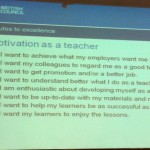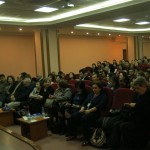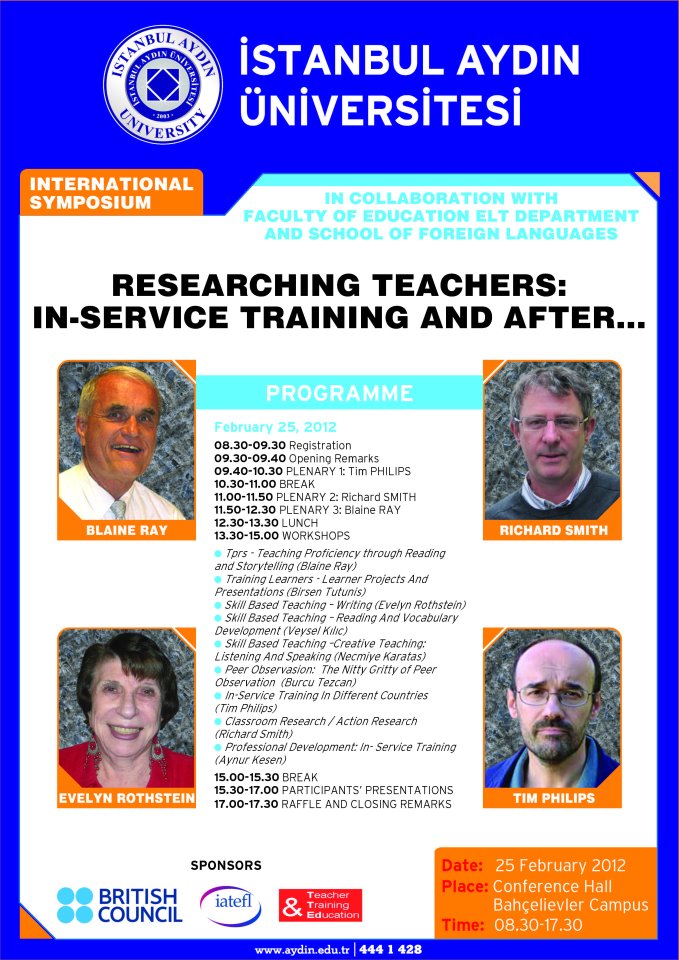The opening speeches of the TTEd SIG Istanbul SYmposium 2012 emphasized how important teacher training and education is in ELT and wished the participants an enjoyable and informative symposium.

Zeynep Urkun
IATEFL Executive Board Member, Zeynep Urkun, who is based in Istanbul joined the conference and addressed the audience at the beginnning of the event, and informed them about the mission of IATEFL and the SIGs after asking the members of IATEFL amongst the audience raise hands, it seemed a group of the audience was already members of IATEFL and the TTEd SIG.
Zeynep underlined the importance of how sharing information and being part of this professional association is to those who are non-members and invited them to stop by at the IATEFL stand and talk to Prof. Birsen Tutunis, (IATEFL TTEd SIG coordinator) and Burcu Tezcan Unal (TTED SIG Publicity and membership officer) for further information.
TEACHERS PROGRESSING – PATHWAYS FOR TEACHERS OF ENGLISH
Plenary Speech 1- Tim Phillips (Head, Teacher Development, Global English, The British Council, Manchester)
Phillips started his talk with a quote from William Ayers (1993) about teachers and teaching:
 “Teaching is not something one learns to do, once and for all, and then practices, problem-free, for a lifetime … Teaching depends on growth and development, and it is practised in dynamic situations that are never twice the same. Wonderful teachers, young and old, will tell of fascinating insights, new understandings, unique encounters with youngsters, the intellectual puzzle and the ethical dilemmas that provide a daily challenge. Teachers, above all, must stay alive to this.”
“Teaching is not something one learns to do, once and for all, and then practices, problem-free, for a lifetime … Teaching depends on growth and development, and it is practised in dynamic situations that are never twice the same. Wonderful teachers, young and old, will tell of fascinating insights, new understandings, unique encounters with youngsters, the intellectual puzzle and the ethical dilemmas that provide a daily challenge. Teachers, above all, must stay alive to this.”
Ayers, W. (1993) To Teach: the journey of a teacher. New York: Teachers College Press. pp. 127-128
![photo[1]](https://ttedsigevents.edublogs.org/files/2012/02/photo1-1h7a255-150x150.jpg) After this opening, Phillips gave a brief summary of teachers’ promotional path;
After this opening, Phillips gave a brief summary of teachers’ promotional path;
- 1. ‘Stayers’ – who have not sought promotion in the past and do not intend to do so in the future
- 2. ‘Movers’ – who have sought promotion in the past and intend to do so again in the future.
- 3. ‘Starters’ – who have not applied in the past but intend to seek promotion in the future.
- 4. ‘Stoppers’ – who have sought promotion before but do not intend to in the future.
Janet Draper, Helen Fraser & Warwick Taylor ,University of Edinburgh, United Kingdom, Teachers’ Careers: accident or design? Teacher Development, Vol. 2, No. 3, 1998
Phillips then mentioned the motivation factor for the teachers and asked the audience what they would be motivated by most from the given list and elicited their answers. 
Phillips reminded the audeince how important it is to ask ourselves what motivates us as teachers, and try to understand what our aspirations are in our career.
Another study about the professional life cycles of teachers that Tim Phillips shared was Huberman’s who divided the years of teaching from 1-3 to 31-40 and enquired how the feelings, the expertise and the motivation change over the years.
Yrs of Teaching Themes
- 1-3 Career entry: Survival and Discovery
- 4-6 Stabilisation
- 7-18 Experimentation/Activism OR Reassessment/Self-doubt
- 19-30 Serenity/Relational Distance OR Conservatism
- 31-40 Disengagement: Serene OR Bitter
Another study again on the topic of professional cycles of teachers was conducted by Berliner suggests the path of a teacher from Novice to Expert teacher. Career stages and typical characteristics that Berliner suggests is as follows:
- Novice: Focuses on student discipline and classroom management. Sees the trees, but rarely the forest.
- Advanced Beginner: Begins to see patterns in behaviours. Begins to see when context guides routines and rules.
- Competent Teacher: Bases behaviour on both experience and formal knowledge. Develops a strategic knowledge of when to apply rules.
- Proficent Teacher: Has a holistic perception of teaching situations. Consciously analyses problems and applies solutions.
- Expert Teacher: Intuitively grasps and deals with classroom situations. Analyses situations with precision and proficiency.

Obviously, Phillips undelines, teachers’ career stages require different kind of support and solutions to the problems. Also, what is going on in the mind of teachers is important regardless of their stage in their careers. Then, he refers to Schön’s model of reflective practice.
Thinking about what you are doing may not be happening efficiently in a young teachers’ classes as they are more focusing on what is happening then. Reflection doesn’t come naturally, teachers need to be trained and supported. So they need support while reflecting as suggested in Dr. Bahar Gun’s study, Phillips refereed to in his speech.
Tim Phillips suggested that teaching how to reflect in teacher education institutions should be part of the curriculum as well as a lot of input on theory and methodology.
How you teach is affected by what kind of a person you are as a teacher and as a complex person; your attitudes, abilities, beliefs, personality traits, content knowledge and pedagogical content knowledge all affect your teaching. Students, the market and the education system all affect the classroom behaviour Phillips suggested. He briefly informed the audience about the mission and the activities that the British Council in terms of Continuing Professional Development. They consider the different career stages of teachers as professionals and offer help and support according to their varying needs. He asked the audience to think about where they are in their carrers by means of the following questions:
- Where are you in your career?
- Have you recently qualified?
- Have you been teaching for a few years or for a very long time?
- What training/courses/workshops/seminars have you done?
- What qualifications have you got?
- What are your skills and strengths?
- What are your achievements?
- How would you assess your level of expertise?
What does British Council do to support teachers in different stages of their career? They offer a professional framework starting from inexperienced teacher to teachers progressing into more advance roles. He gave a list of newly qualified teachers as follows:
- Finding your career pathway
- Understanding your learners
- Building your confidence as a teacher of English
- Knowing what good teaching of English is
- Getting feedback on your teaching
- Turning theory into practice and knowing how/where to get more theoretical knowledge that’s relevant
- Knowing where to find classroom resources especially to match those resources to learners needs
- Learning more about specific areas of ELT such as business English or young learners
The British Council helps newly qualified teachers’ common needs such as understanding their learner, managing time, being open to feedback.
Phillips then mentioend the importance of networking for teachers and their development. This may be informal staffroom teacher exchange to, conferences, SIG groups, associations and online networks. Development can be followed up by keeping teacher portfolios and journals.
Finally, Tim Phillips gave the website addresses for teacher development and finished his talk by saying éTeachers are learners too, which is a life long journey”.
http://www.teachingenglish.org.uk/
http://learnenglish.britishcouncil.org/en/
englishagenda.britishcouncil.org
 nd after..) as ambiguous since it may be interpreted as research on teachers or by teachers:
nd after..) as ambiguous since it may be interpreted as research on teachers or by teachers: tonomy. “The ability to take charge of one’s own learning…. To take charge of one’s own learning is to have , and to hold, the responsibility for all the decisions cncerning all aspects of this learning.”
tonomy. “The ability to take charge of one’s own learning…. To take charge of one’s own learning is to have , and to hold, the responsibility for all the decisions cncerning all aspects of this learning.” Richard then proposed: Teacher educators should also exercise their own teacher-learner autonomy, and encourage themselves/ one another to research their own teacher education practice.
Richard then proposed: Teacher educators should also exercise their own teacher-learner autonomy, and encourage themselves/ one another to research their own teacher education practice.


![photo[1]](https://ttedsigevents.edublogs.org/files/2012/02/photo1-1h7a255-150x150.jpg)


